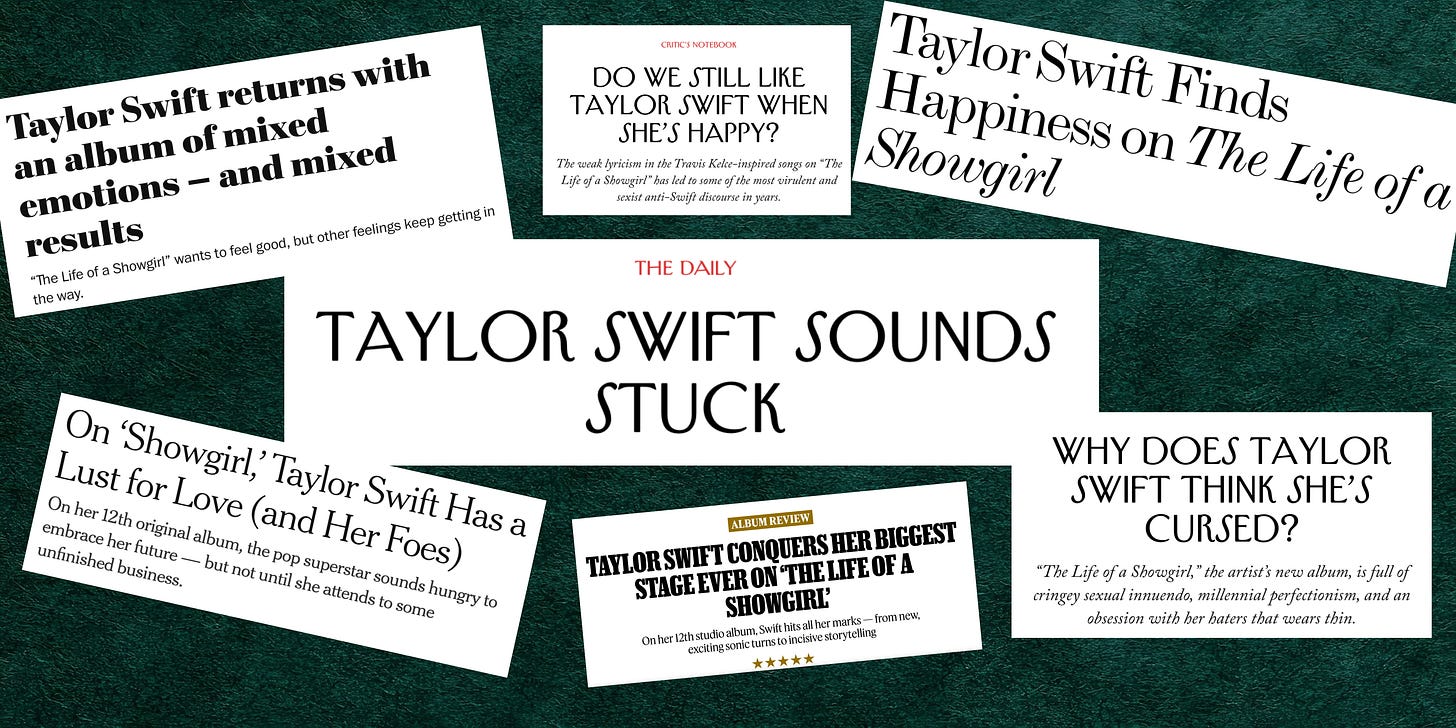Reading in Public No. 86: Reflections on criticism in a monocultural moment
Next to no thoughts on Taylor, lots of thoughts on book criticism
As we know all too well, Taylor Swift released a new album last week and it took over the internet. I am not a Swifty (is that the singular or is it still with an “ie”?) but I like her music well enough. My first year teaching high school one of my students burned me a copy of 1989 and turned it in with a late assignment and now that album feels like the soundtrack to that year. And I wasn’t mad when my baby went through a phase where she would only nap in the car to folklore and evermore tunes. During that stage, I had a lot of fun putting together Era-inspired book lists:
I haven’t really listened to much of the music that’s come out since then, and I’ve only gotten a taste of The Life of a Showgirl when it was on as background music during my Pilates class on Friday. But I do read the reviews. As much as Swifties look forward to the album drop, I look forward to the cultural criticism. There are so few monocultural moments and not much art or entertainment that can take up the space of an entire weekend, so when one comes along, I find a lot of delight in taking in all of the commentary. I know many people get tired of “the discourse” and roll their eyes at a Substack feed filled with Taylor thinkpieces, but I just love reading reviews of anything and I enjoy seeing the influx of opinions.
So while I do not have a strong opinion to share about Taylor Swift or the new album, I did spend some time this weekend swimming in the cultural soup of all the reviews and it got me thinking a lot about book reviews and literary criticism. I haven’t given them time to arrange themselves into an argument about what we need in the book review space, but here are some thoughts that have been rolling around in my brain during this moment of monocultural criticism.
As my friend always says, talking shit about books is good for books. This new album has not been particularly well-reviewed, but the more critics pan it, the more people listen and respond to those pans. The negative reviews seem to perhaps generate more excitement, passion, and discussion than glowing reviews would. This feels similar to what happened with the new Elizabeth Gilbert book. Certainly the pans made me more interested in reading it. Perhaps we should be a little less precious about how we review books and get comfortable calling books bad if we think they are bad rather than side stepping that with “it wasn’t for me.” I get that there’s a difference in attitude when we’re critiquing a rich white woman who’s already experienced immense success than when we’re reviewing a book by a debut novelist, but we can’t have real discussions if no one is saying anything real. Which brings me to…
I love conversational criticism. My favorite form of cultural criticism is a discussion in which two or more thoughtful people are trying to make sense and arrive at some greater truth through dialogue. That’s why I love podcasts like Critics at Large and the NYT Book Review book club episodes. When there’s a monocultural moment and every critic at every publication is writing about the same artist, this type of conversational criticism can happen in writing across outlets and platforms. I would love to see this kind of thing happen for books. I know we’re never going to get every single media outlet sharing at least one and sometimes multiple reviews of a single book, but I think we can still foster this in the book world. Both in traditional publications and online book review spaces (Substack, IG, Goodreads, etc.) book reviews feel very siloed. One reviewer shares their opinion about one book. And I would really enjoy reading more criticism that is responding to other criticism! I would love to see more book reviews that explain what such-and-such other reviewer missed in their reading, not in a mean-spirited way, but because we can arrive at more interesting and complex interpretations collectively than in isolation.
I don’t think critics are really talking to fans, but fans can talk back. When I think about how I would distinguish book reviews from literary criticism, it’s that reviewers are talking to readers and critics are talking to other critics. Neither of these is a hard and fast rule, but in general, a review is there to help an audience determine if they want to spend their time on a piece of art. A work of criticism is there to position that piece of art in a larger cultural moment and legacy. Because most people have already decided whether they’re going to listen to a new Taylor Swift album or not, even the album reviews function more as cultural criticism than review. Of course, anyone can enjoy criticism, but when I read true criticism I don’t feel like I am the imagined reader. But I really love these moments where cultural criticism becomes so hard to ignore that fans—regular readers or listeners, as the case may be—start talking back to the critics and repositioning the art on their own terms. I love this because it moves everyone beyond the limits of liked it or didn’t like it, and into a larger conversation about the purpose of art and what makes art worthwhile. I’d love to see the bookish corner of the internet infused with this kind of energy.
That being said, I want to banish the phrase “let people enjoy things” from the internet. People not liking something I like, is not “not letting me enjoy” the thing. If it is, that is a me problem. I think Swifties and readers might have the common trait of thin skin when it comes to people critiquing our favorites. It’s fine to avoid cultural criticism if you want to preserve your feelings about beloved book in amber, but I think the idea that no one should critique anything so others can enjoy it is actually quite harmful.
There is, in fact, room for “I didn’t like this because I wanted it to be something else” criticism. If you’ve been reading this newsletter for awhile, you probably know that one of my biggest book review pet peeves is when a review can be boiled down to “I didn’t like this book because I wanted it to be a different book.” I will probably always find this kind of review obnoxious and unhelpful, and I do believe that every review or piece of criticism must engage with what the work was trying to do in order to be a good faith piece. But over the weekend I kept thinking about where and how there is a place for these kind of reviews. First, I think good criticism can and should ask what a book is trying to do, whether or not it does that successfully, and then whether the thing it is attempting is a worthwhile project in the first place. I see this as a little bit different than “I wanted it to be something else,” but there are certainly similarities. And I do think there’s a lot of value in evaluating the value not just of the art, but of the art’s intended purpose. Additionally, the “I wanted it to be something else” critique feels more appropriate when we’re looking at the entire career of a writer. When someone has a vast collection of work and we’ve watched them evolve and return to similar themes in new ways over the course of years, we can’t really help but critique a new book in the context of everything that came before. In these circumstances, I think it’s probably fair to express our disappointment if we don’t like where a writer has chosen to go next.
I realized that I’m curious how much effort a reader puts into grasping a book before they review it. One of the takes I saw circling the internet about the Taylor album is that you have to listen to it multiple times and the right way (one of which seems to be driving alone for the length of the album?) in order to have a proper opinion. I think this is largely bullshit—anyone can have an opinion about anything, of course. On the other hand, I actually agree that if someone is purporting to offer a book review, I do want to know how much good faith effort they put into engaging with the book. I see so many book reviews panning a book because it “didn’t grab me” or “I just didn’t connect.” This is a perfectly valid response to any piece of art, but maybe there is some sort of literary version of the listen-in-the-car test. Like if I didn’t get into a book but only listened on audio and didn’t rewind even if I knew I missed something, I think I should bring that to a review. I really believe that the attention and effort a reader puts in has as much effect on the meaningful impact of a book as what the writer does on the page.
We need more book reviews. Finally, just being awash in so much music criticism coming from everywhere and everyone made me wish people got as fired up about books. I want to see more reviews and I want to see more passionate reviews that make the internet sit up and take notice, whether or not we agree. I think we should get more boisterous about books.
Tell me your thoughts! Did you listen to The Life of a Showgirl? Read the reviews? What about this monocultural moment in cultural criticism would you like to see infiltrate the book world?
For questions, comments, or suggestions, please don’t hesitate to reach out by emailing fictionmattersbooks@gmail.com or responding directly to this newsletter. I love hearing from you!
This email may contain affiliate links. If you make a purchase through the links above, I may earn a small commission at no additional cost to you.
If you enjoyed today’s newsletter, please forward it to a book-loving friend. That’s a great way to spread bookish cheer and support the newsletter!
Happy reading!
Sara







I appreciate your comments about how much effort or intention a reader brings to book before dismissing it in a negative "review." Nick Hornby once said, “We are never allowed to forget that some books are badly written; but we should remember that sometimes they're badly read, too.” Sometimes I find a book impenetrable but when I do, it is often because I have "badly read" it. I am too tired, too distracted, wanting it to be something other than it is, etc... I am always hesitant then to blame the book.
I love this take on criticism. There should be space for it, not just screaming back and forth about who's right and who's wrong